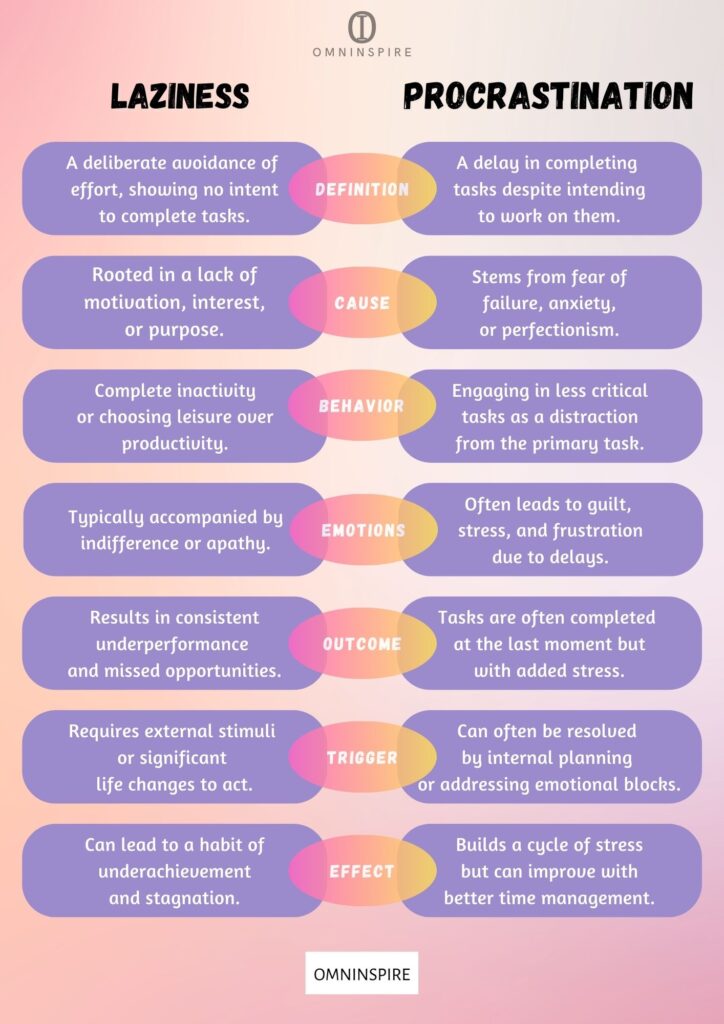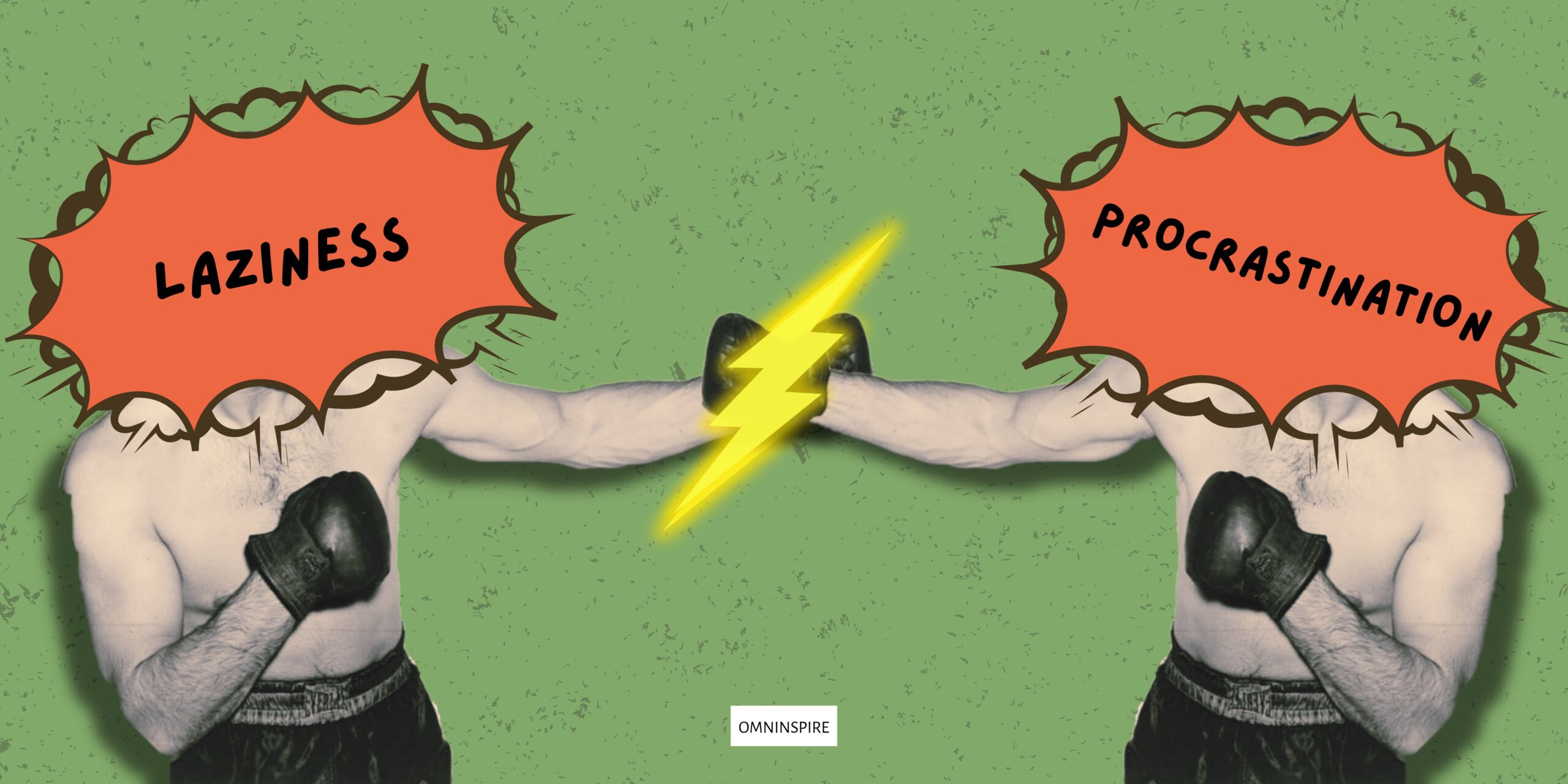When productivity falters, people often attribute it to laziness or procrastination. While they might seem similar, laziness and procrastination are distinct behaviors with different causes and impacts. Laziness refers to a lack of willingness to exert effort, whereas procrastination involves delaying tasks despite an intention to complete them. Both can hinder personal and professional growth, but the solutions to address each are unique.
In this article, we will delve into the differences between laziness and procrastination, explore their root causes, and provide actionable strategies to overcome them. Understanding these behaviors is the first step to reclaiming your time and boosting your productivity.
What Is Laziness?
Laziness is characterized by an unwillingness to engage in effortful activities. People often choose relaxation or idleness over tasks that require work. It stems from a lack of motivation, purpose, or physical energy.
For instance, someone might spend the entire weekend watching television instead of tackling household chores. While occasional rest is necessary for health, consistent laziness can lead to missed opportunities and unfulfilled potential.
Laziness is not always a negative trait. Sometimes, it’s a sign that your body or mind needs a break. However, chronic laziness can cause long-term issues such as decreased productivity, strained relationships, and low self-esteem.
What Is Procrastination?
Procrastination, on the other hand, is the act of delaying tasks, even when you know their importance. It involves choosing less critical activities over more urgent responsibilities. Unlike laziness, procrastination does not mean avoiding effort altogether but rather misdirecting it.
For example, a student might clean their room or organize their notes instead of studying for an exam. Procrastinators often feel busy but fail to focus on the tasks that matter most.
Procrastination is often rooted in emotional factors such as fear of failure, perfectionism, or feeling overwhelmed. It can create a cycle of stress, guilt, and panic, especially as deadlines approach.
Key Differences: Laziness vs. Procrastination
Understanding the distinction between laziness and procrastination is essential for addressing these behaviors effectively.

Causes of Laziness
Laziness often stems from deeper issues that need addressing;
- Lack of Interest
Tasks that feel irrelevant, uninteresting, or uninspiring often fail to spark effort or motivation. This lack of intrinsic interest may result in avoiding the task altogether, not even attempting to engage. For instance, someone might skip cleaning their room entirely because they don’t see any immediate benefit from the effort.
Research on intrinsic motivation highlights that tasks with personal relevance are more likely to encourage participation. Associating a mundane task with a positive outcome, like reduced stress or improved focus, can increase motivation.
- Low Energy Levels
Laziness can also be the result of physical or mental exhaustion. Fatigue, a poor diet, and insufficient exercise can sap your energy, making even minor tasks feel monumental. For instance, someone who sleeps only four hours a night may lack the physical stamina to tackle demanding tasks.
A study published in Health Psychology shows that consistent exercise improves energy levels and reduces perceived effort, helping combat laziness.
- Absence of Goals
Without clear objectives, individuals may feel adrift and unmotivated to act. A lack of direction can make tasks seem pointless, leading to disengagement. For example, a professional with no career roadmap might struggle to find motivation for daily work tasks.
The goal-setting theory developed by Edwin Locke and Gary Latham emphasizes that specific and challenging goals lead to higher performance compared to vague objectives.
Causes of Procrastination
Procrastination, however, arises from different emotional and psychological factors;
- Fear of Failure
The fear of not performing well often drives procrastination. This fear can stem from a lack of confidence, past experiences, or high stakes associated with the task. For instance, an employee might delay preparing for a presentation because they’re anxious about being judged.
A study published in the Journal of Behavioral Science found that cognitive restructuring, where individuals actively challenge negative thoughts about failure, significantly reduces procrastination behaviors.
- Perfectionism
Perfectionists often delay starting tasks due to the fear that their efforts won’t meet their high standards. This focus on producing flawless results creates pressure that paralyzes action. For example, a writer might avoid starting a book draft because they’re afraid it won’t meet their creative vision.
Research from Psychological Bulletin highlights that individuals with high levels of perfectionism are more prone to procrastination due to fear of criticism or judgment.
- Overwhelm
Large, complex tasks can feel intimidating and insurmountable. This overwhelm leads to avoidance, as the individual doesn’t know where to begin. For example, a student may procrastinate on a research project because they feel the workload is too daunting.
According to a study in the Journal of Organizational Behavior, breaking down tasks into smaller parts increases the likelihood of task completion by reducing cognitive load.
How to Overcome Laziness
Addressing laziness involves creating an environment that fosters motivation and energy;
- Set Small Goals
Large tasks can feel overwhelming, leading to inaction. Breaking them into smaller, manageable steps can reduce this intimidation and create a sense of accomplishment with each milestone. For instance, instead of aiming to clean the entire house in one day, start with organizing a single room or even a drawer.
According to the Progress Principle, achieving even minor milestones releases dopamine, a feel-good chemical, which encourages continued effort.
- Build a Routine
Relying solely on motivation can be unreliable, as it fluctuates daily. Establishing consistent habits helps reduce decision fatigue and builds momentum over time. For example, a morning routine that includes 10 minutes of exercise, 15 minutes of planning, and a healthy breakfast can set a productive tone for the day.
A study in Personality and Social Psychology Review highlights that habits, once formed, require less cognitive effort, reducing the likelihood of laziness.
- Create a Supportive Environment
The environment you work in can either fuel laziness or productivity. A cluttered, noisy, or uncomfortable space might discourage effort. Conversely, an organized and inspiring setting encourages action.
Environmental psychology emphasizes that a supportive setting enhances productivity and reduces tendencies toward inactivity.
By incorporating these strategies, you can replace laziness with productive habits over time.
How to Overcome Procrastination
To combat procrastination, you need strategies that address emotional barriers;
- Use Time Blocking
Time blocking involves assigning specific time slots to tasks. This structured approach ensures that every task has a designated moment in your schedule. For example, set aside 30 minutes each morning to work on a critical project before distractions arise.
A study published in the Journal of Applied Psychology found that structured scheduling increases productivity by reducing procrastination and enhancing focus.
- Start with the Hardest Task
This method, often called “eating the frog,” suggests tackling the most challenging or important task first. Once completed, this provides a sense of accomplishment and makes the rest of the day feel easier.
The Peak-End Rule, a psychological concept, suggests that starting with the most challenging task creates a high point of accomplishment, improving overall productivity for the day.
- Set Deadlines
Deadlines, even self-imposed ones, create a sense of urgency. They help combat the illusion that you have unlimited time to complete a task, which often leads to procrastination.
The Temporal Motivation Theory highlights that tasks with closer deadlines are perceived as more urgent and are more likely to be prioritized. Procrastinators often benefit from accountability partners or tools like timers and productivity apps.
The debate of laziness vs. procrastination goes beyond semantics. Laziness involves an unwillingness to act, while procrastination is the act of delaying action despite intending to complete a task. Recognizing the root causes of these behaviors is essential for addressing them effectively.
By applying tailored strategies, you can overcome both and unlock your full potential. Whether it’s building routines to combat laziness or using time-blocking to tackle procrastination, the key is to take consistent, intentional steps toward your goals.







